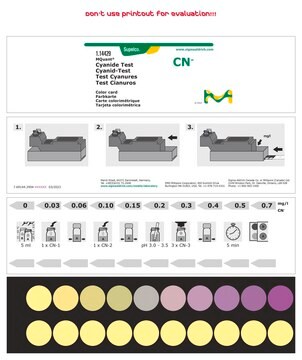1.14561
Cyanide Test, photometric
photometric, 0.010-0.500 mg/L (CN-)
About This Item
Polecane produkty
product name
Cyanide Cell Test, photometric, 0.010-0.500 mg/L (CN-)
zastosowanie
sufficient for 25 tests
Poziom jakości
specyficzne anality
cyanide
zakres pomiaru
0.010-0.500 mg/L (CN-)
metody
photometry: suitable
kompatybilność
for use with Spectroquant® Move 100
for use with Spectroquant® Nova 60 A
for use with Spectroquant® Prove 100
for use with Spectroquant® Prove 300
for use with Spectroquant® Prove 600
metoda wykrywania
photometric (Barbituric acid, pyridine-carboxylic acid)
temp. przechowywania
15-25°C
Opis ogólny
This Spectroquant® Cyanide Cell Test allows the accurate quantification of the free and readily liberated cyanide content in aqueous samples.
Method applied: Cyanide ions react with a chlorinating agent to form cyanogen chloride which together with 1,3-dimethylbarbituric acid forms a violet dye (pyridine-free König reaction) that is determined photometrically.
The Spectroquant® Cell Tests come with prefilled 16 mm round cells and all the required reagents to perform the analysis according to the instruction leaflet provided.
All Spectroquant® Cell and Reagent Test Kits are equipped with the unique Live ID (2D barcode) which allows seamless method recognition and contains essential information such as lot number, expiry date, and automatic calibration updates.
Informacje prawne
Hasło ostrzegawcze
Danger
Zwroty wskazujące rodzaj zagrożenia
Zwroty wskazujące środki ostrożności
Klasyfikacja zagrożeń
Aquatic Chronic 3 - Eye Dam. 1 - Met. Corr. 1 - Skin Corr. 1A - STOT SE 3
Organy docelowe
Respiratory system
Kod klasy składowania
8A - Combustible, corrosive hazardous materials
Klasa zagrożenia wodnego (WGK)
WGK 2
Certyfikaty analizy (CoA)
Poszukaj Certyfikaty analizy (CoA), wpisując numer partii/serii produktów. Numery serii i partii można znaleźć na etykiecie produktu po słowach „seria” lub „partia”.
Masz już ten produkt?
Dokumenty związane z niedawno zakupionymi produktami zostały zamieszczone w Bibliotece dokumentów.
Nasz zespół naukowców ma doświadczenie we wszystkich obszarach badań, w tym w naukach przyrodniczych, materiałoznawstwie, syntezie chemicznej, chromatografii, analityce i wielu innych dziedzinach.
Skontaktuj się z zespołem ds. pomocy technicznej

